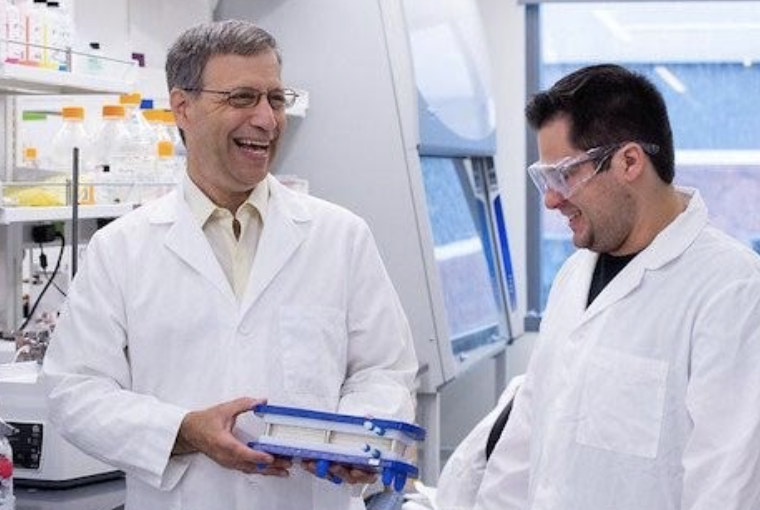career of the month
Chemical Engineer Andrew Zydney
Chemical engineers apply a knowledge of chemistry, biology, physics, and math to the production or use of pharmaceuticals, foods, cosmetics, fuels, and many other types of products. Chemical engineers can work for industry, academia, government or nonprofits, and can focus on up-front research, the design of manufacturing plants, the formulation of products, or the treatment of byproducts, among other aspects. Andrew Zydney teaches undergraduate and graduate courses and oversees a research program in chemical engineering at Penn State University.
Work overview
I teach courses ranging from introductory classes in industrial biotechnology and material balances, to advanced classes in bioseparations and drug delivery. I also run a major research program studying membrane separation processes, using porous polymers to separate cells and proteins based on differences in size and their interactions with the membrane surface. Our particular interest is in the use of membranes to purify medical products such as vaccines, gene therapy agents, and antibodies for treating cancer and autoimmune diseases. These products need to be purified to incredibly high levels, because they are injected directly into patients, bypassing the body’s normal protections. Membranes are used instead of heat pasteurization to remove larger bacteria, ensuring that these biological products are completely sterile.
I split my time between these two areas of focus. I prepare lecture material for my classes, grade homework assignments and exams, and answer students’ and advisees’ questions. I also meet with my graduate students to discuss their experiments, write papers and funding proposals, and discuss our latest results with collaborators in industry. Because of how large my research group has grown, and my many other commitments, I no longer have time to be in the lab myself on a regular basis.
I love working with students. There is nothing more satisfying than seeing students have “aha!” moments when everything clicks. I also love doing research and discovering new purification approaches that can really make a difference in people’s lives. My least favorite part of the job is probably grading papers and exams. There is also an incredible amount of bureaucracy involved in running a large research program, including filing the necessary paperwork and reports to maintain research grants and comply with university and federal regulations.
Career highlights
I recently received a top award from the American Institute of Chemical Engineers, for contributions to chemical engineering education, as well as a very prestigious award from the North American Membrane Society, for innovation in the field of membrane science. I also still remember the incredible day when I received tenure at the University of Delaware, and all of the students in my group took me out to celebrate.
Career path
I was always interested in science and math, which were my best subjects as far back as elementary school. One of my high-school teachers suggested I consider an engineering major, so that was on my mind when I started college. I took an introductory chemical engineering course during my sophomore year, and the instructor convinced me that chemical engineering was the perfect major. I conducted research in his lab the following semester and was hooked.
At the start of my senior year, I was torn between continuing on to medical school or a graduate program in chemical engineering. I applied and was accepted to both. I visited several chemical engineering graduate schools, and in each case came away excited and energized about what the students were doing and the incredible range of research opportunities. That made the final decision pretty easy. I got my PhD at MIT and then got a job as an assistant professor of chemical engineering at the University of Delaware. I stayed there for 17 years, working my way up to full professor. I then moved to Penn State and have been on the faculty here since 2002, also serving as head of the Department of Chemical Engineering for 10 of those years.
Knowledge, skills, and training needed
You need very strong technical skills to be successful as a chemical engineering professor, with a strong background in basic science, math, and engineering principles. But you also need to be an effective communicator and writer. Much of the impact of my research has come from people in industry learning about our work through my publications or presentations, and then incorporating our insights and results in their manufacturing processes.
Advice for students
In terms of chemical engineering, you need to be a great problem solver who enjoys working with molecular-level phenomena, whether biomolecules (as in the case of my research) or petroleum-derived products. To be a professor, you need to have a love of learning and a passion for research. Follow your passions and don’t be afraid to go after what you want. This might involve applying for a scholarship or award even when you know the competition is going to be really tough, or pursuing a job opportunity that you think might be a bit out of reach. You won’t always succeed, but it’s great to set high personal goals and then strive to achieve them. That journey is part of what keeps life exciting, and you may even surprise yourself with how much you can accomplish if you set your mind to it.
Bonus points
Zydney’s Education: B.S. in chemical engineering, Yale University. PhD in chemical engineering, MIT.
On the Web: https://www.aiche.org/; https://membranes.org/
Related Careers: bioprocess engineer, process engineer, research and development scientist
Careers Chemistry STEM High School



